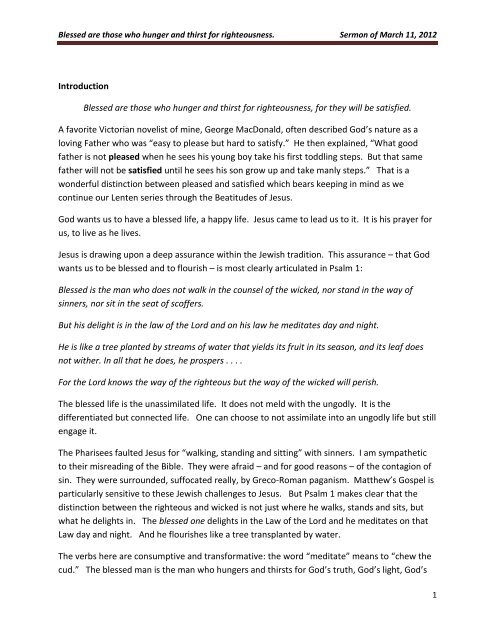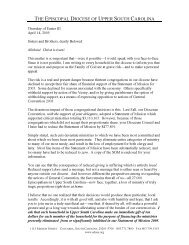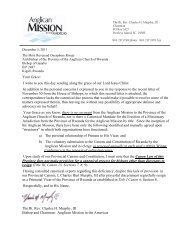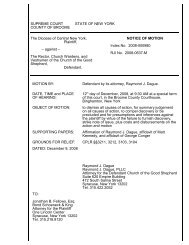Blessed are those who hunger and thirst for ... - Stand Firm
Blessed are those who hunger and thirst for ... - Stand Firm
Blessed are those who hunger and thirst for ... - Stand Firm
You also want an ePaper? Increase the reach of your titles
YUMPU automatically turns print PDFs into web optimized ePapers that Google loves.
<strong>Blessed</strong> <strong>are</strong> <strong>those</strong> <strong>who</strong> <strong>hunger</strong> <strong>and</strong> <strong>thirst</strong> <strong>for</strong> righteousness. Sermon of March 11, 2012Introduction<strong>Blessed</strong> <strong>are</strong> <strong>those</strong> <strong>who</strong> <strong>hunger</strong> <strong>and</strong> <strong>thirst</strong> <strong>for</strong> righteousness, <strong>for</strong> they will be satisfied.A favorite Victorian novelist of mine, George MacDonald, often described God’s nature as aloving Father <strong>who</strong> was “easy to please but hard to satisfy.” He then explained, “What goodfather is not pleased when he sees his young boy take his first toddling steps. But that samefather will not be satisfied until he sees his son grow up <strong>and</strong> take manly steps.” That is awonderful distinction between pleased <strong>and</strong> satisfied which bears keeping in mind as wecontinue our Lenten series through the Beatitudes of Jesus.God wants us to have a blessed life, a happy life. Jesus came to lead us to it. It is his prayer <strong>for</strong>us, to live as he lives.Jesus is drawing upon a deep assurance within the Jewish tradition. This assurance – that Godwants us to be blessed <strong>and</strong> to flourish – is most clearly articulated in Psalm 1:<strong>Blessed</strong> is the man <strong>who</strong> does not walk in the counsel of the wicked, nor st<strong>and</strong> in the way ofsinners, nor sit in the seat of scoffers.But his delight is in the law of the Lord <strong>and</strong> on his law he meditates day <strong>and</strong> night.He is like a tree planted by streams of water that yields its fruit in its season, <strong>and</strong> its leaf doesnot wither. In all that he does, he prospers . . . .For the Lord knows the way of the righteous but the way of the wicked will perish.The blessed life is the unassimilated life. It does not meld with the ungodly. It is thedifferentiated but connected life. One can choose to not assimilate into an ungodly life but stillengage it.The Pharisees faulted Jesus <strong>for</strong> “walking, st<strong>and</strong>ing <strong>and</strong> sitting” with sinners. I am sympatheticto their misreading of the Bible. They were afraid – <strong>and</strong> <strong>for</strong> good reasons – of the contagion ofsin. They were surrounded, suffocated really, by Greco-Roman paganism. Matthew’s Gospel isparticularly sensitive to these Jewish challenges to Jesus. But Psalm 1 makes clear that thedistinction between the righteous <strong>and</strong> wicked is not just where he walks, st<strong>and</strong>s <strong>and</strong> sits, butwhat he delights in. The blessed one delights in the Law of the Lord <strong>and</strong> he meditates on thatLaw day <strong>and</strong> night. And he flourishes like a tree transplanted by water.The verbs here <strong>are</strong> consumptive <strong>and</strong> trans<strong>for</strong>mative: the word “meditate” means to “chew thecud.” The blessed man is the man <strong>who</strong> <strong>hunger</strong>s <strong>and</strong> <strong>thirst</strong>s <strong>for</strong> God’s truth, God’s light, God’s1
<strong>Blessed</strong> <strong>are</strong> <strong>those</strong> <strong>who</strong> <strong>hunger</strong> <strong>and</strong> <strong>thirst</strong> <strong>for</strong> righteousness. Sermon of March 11, 2012righteousness. And this longing is eventually satisfied. Jesus could walk, st<strong>and</strong>, sit <strong>and</strong> even eatwith sinners, because he first delighted to walk, st<strong>and</strong>, sit <strong>and</strong> eat with his heavenly Father <strong>who</strong>loved them so. Jesus also knew that contagion works in reverse. People can catch faith <strong>and</strong>holiness, too. People gathered around Jesus, <strong>and</strong> over time, they came down with a bad caseof hospitality. A peace-making virus broke out when Jesus came to town. Jesus delighted inthe glory of the Lord <strong>and</strong> his delight <strong>and</strong> his way of showing it was contagious.This background connects us to the beatitude we <strong>are</strong> considering this morning. So let’s put thequestion directly on the table: What does it mean to <strong>hunger</strong> <strong>and</strong> <strong>thirst</strong> after righteousness?This beatitude attaches concrete verbs to an abstract noun, not unlike “eating beauty,” or“embracing truth.” Why the combination of the concrete with the abstract?I think Jesus wants us to not only take this concept of righteousness seriously but to reconceiveit. He says in effect, “Thirst <strong>for</strong> it like water. Hunger <strong>for</strong> it as you <strong>hunger</strong> <strong>for</strong> bread.” For youmust. No family can af<strong>for</strong>d to have a righteous-free diet; no church can fast from righteousness<strong>and</strong> remain healthy. Our nation will go to hell if there is a famine of righteousness in our l<strong>and</strong>.We need righteousness <strong>and</strong> we need to recover our <strong>hunger</strong> <strong>for</strong> it quickly if we have lost ourappetite.So what is it? What is this righteousness that we <strong>are</strong> to seek so deeply?Luther said that Jesus is not referring to the righteousness that is imputed to us in justification.This is telling, because Luther had an acute sense of seeing justification all over the place. Buthe said this is not the righteousness Jesus is talking about here. This is not imputedrighteousness but imparted righteousness. To be precise, he said, “There<strong>for</strong>e take this in thesense of the outward righteousness be<strong>for</strong>e the world, which we maintain in our relations witheach other.” This righteousness is the world working right – its systems <strong>and</strong> institutions <strong>and</strong><strong>those</strong> <strong>who</strong> lead <strong>and</strong> abide in them – just as God made it. Do you <strong>hunger</strong> <strong>for</strong> that?The Lutheran scholar Joseph Sittler was traveling in Israel when his vehicle broke down. Hefound an Israeli mechanic, a Sabra, as native Israelis <strong>are</strong> known in Israel. The Sabra mechanicspent a couple of hours diagnosing <strong>and</strong> then fixing the carburetor. Once he thought he had itright, he told Dr. Sittler to turn the ignition – <strong>and</strong> it started right up. The mechanic stood erect<strong>and</strong> exclaimed, “Tzedehk!” Tzedehk is the Hebrew word <strong>for</strong> “righteous.” Righteousnessobtains when things <strong>are</strong> working right, when the world is humming!Jesus says if the home is not humming, if the church is not humming, <strong>and</strong> if the world is nothumming, then the blessed person is the one <strong>who</strong> is longing <strong>for</strong> it to be so. And if we do notlong <strong>for</strong> it, we will not work to make it so. Mechanics long <strong>for</strong> cars to run right. And Christianslong <strong>for</strong> the world to run right. Or we should.2
<strong>Blessed</strong> <strong>are</strong> <strong>those</strong> <strong>who</strong> <strong>hunger</strong> <strong>and</strong> <strong>thirst</strong> <strong>for</strong> righteousness. Sermon of March 11, 2012A more precise translation <strong>for</strong> righteousness in this context is “restorative justice.”Restorative justice is that branch of law which seeks to not only to meet out just punishment<strong>for</strong> crimes committed but also to restore to health all <strong>those</strong> affected by the crime, including thecriminal. Here is a good definition of restorative justice:Restorative justice is different from contemporary criminal justice practice in a numberof ways. It views criminal acts more comprehensively: rather than limiting crime tolawbreaking, it recognizes that offenders harm victims, communities, <strong>and</strong> eventhemselves. It involves more parties: rather than including only the government <strong>and</strong> theoffender in key roles, it invites victims <strong>and</strong> communities as well. It measures successdifferently: rather than measuring how much punishment has been inflicted, it measureshow much harm has been repaired or prevented. Finally, rather than leaving theproblem of crime to the government alone, it recognizes the importance of communityinvolvement <strong>and</strong> initiative in responding to <strong>and</strong> reducing crime.Our own Sr. Warden, Dan Van Ness, wrote that definition <strong>and</strong> the definitive book from which Iquoted. I confess to having read it only this week. I have learned much from it. For example,restorative justice pertains to more than crime. Another way Dan has described restorativejustice is that it has three key features:1. The first is encounter: the people affected by the wrongdoing or conflict meet together.2. The second is repair: the emphasis of that meeting is to identify the harm that has beendone <strong>and</strong> take steps toward making things right.3. The third is trans<strong>for</strong>mation (this does not always happen): the people, relationships <strong>and</strong>sometimes even structures can change as a result of the encounter <strong>and</strong> repair that theparties engage in.For the past few years a number of us, including Dan, have <strong>hunger</strong>ed <strong>for</strong> this kind ofrighteousness <strong>and</strong> we have sought to satisfy this <strong>hunger</strong> by working <strong>for</strong> it. Let me tell you thestory of how we have reached out to the Diocese <strong>for</strong> a more righteous relationship <strong>and</strong>outcome.1. Encounter – I reached out to Bishop Shannon over a year ago. He quickly <strong>and</strong> graciouslyreciprocated. In our first meetings, we did not paper over the differences between us,but neither did we exaggerate them. We began by accurately naming the cause(s) ofdivision (i.e. it is more about anthropology than Christology) <strong>and</strong> restoring trust.2. Repair – over the past year of meetings, we have identified some of the harm that hasbeen done <strong>and</strong> we have begun, even be<strong>for</strong>e the litigation concluded, to take steps tomake things right. I have treated Bishop Shannon as a bishop of the AnglicanCommunion <strong>and</strong> with the respect that is due a fellow Christian. I have opened up3
<strong>Blessed</strong> <strong>are</strong> <strong>those</strong> <strong>who</strong> <strong>hunger</strong> <strong>and</strong> <strong>thirst</strong> <strong>for</strong> righteousness. Sermon of March 11, 2012relationships <strong>and</strong> ministry opportunities to him in the CofE. He has reciprocated byallowing me to minister in Episcopal parishes in the Diocese of Virginia as DOK Chaplain<strong>and</strong> has encouraged my relationship with VTS <strong>and</strong> Dean Ian Markham, <strong>who</strong> has invitedme to teach a missions course there. The old habit of trying to “displace” each otherhas been rejected as unworthy of disciples. On the contrary, we <strong>are</strong> trying to help eachother <strong>and</strong> bless each other where we can legitimately do so.3. Trans<strong>for</strong>mation - Though our relationship is being trans<strong>for</strong>med, we <strong>are</strong> still waiting <strong>for</strong>our communities’ relationship to be affected. I think we may be seeing the first-fruits of<strong>those</strong> ef<strong>for</strong>ts.So what is the fruit of this longing <strong>and</strong> acting <strong>for</strong> restorative justice, this <strong>hunger</strong>ing <strong>and</strong> <strong>thirst</strong>ing<strong>for</strong> righteousness?1. We <strong>are</strong> invited to stay on our church campus until August 31 st rent-free. This is aminimum. We may arrange a longer term to stay. Dan <strong>and</strong> Tom <strong>are</strong> working diligentlyon <strong>those</strong> negotiations. They <strong>are</strong> practicing restorative justice. In their <strong>hunger</strong> <strong>for</strong>righteousness they <strong>are</strong> pursuing it with energy <strong>and</strong> good faith.2. The Bishop of Virginia, Shannon Johnston, has secured a two year reprieve from TEC’srequirement that Anglican churches that use Episcopal buildings disaffiliate from allAnglican bodies. This change in policy gives us the possibility <strong>for</strong> a longer negotiatedstay in these buildings <strong>and</strong> less possible disruption to our ministries <strong>and</strong> the time tocontinue to work <strong>for</strong> righteousness in our relationships.There <strong>are</strong> many particulars <strong>for</strong> the vestry <strong>and</strong> diocese to negotiate <strong>and</strong> we <strong>are</strong> in a very delicateplace in our relationship, but this does signify a breakthrough. So you might rightly ask me,Tory, <strong>are</strong> you satisfied? No, I am not. And far from it. But I am pleased. Very pleased.4





